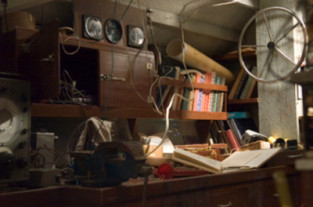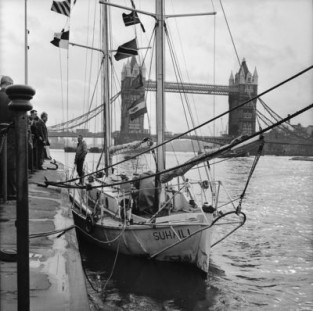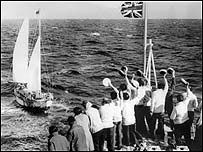Jonty Pearce wonders if they still make heroes in the same mould as those of the Golden Globe Race
Every now and then I like to read about the race to be first to sail round the world non-stop. This was a challenge adopted, promoted, and sponsored by the Sunday Times as the ‘Golden Globe’ race in the aftermath of Sir Francis Chichester’s triumphant circumnavigation with one stop in Australia in 1966-7. By dint of some nifty journalistic footwork the Sunday Times succeeded in drawing together a diverse group of adventurers to participate in a scheme so simple that, even if they did not choose to formally enter, they would be included in the race by default.
Despite the fact that some of the ‘entrants’ had already made their individual plans and had begun their preparations, they were drawn in by the paucity and logicality of the rules: the departure and finish line had to be from the same port north of a latitude of 40 degrees, and the start could be on any day after 1st June 1968 and before 31st October 1968. Finally, the route had to run round the three great capes of Good Hope, Leeuwen, and Horn without outside assistance or landing. The prize was, of course, a Golden Globe and the associated fame and fortune of being the premier sailor of the day; in those days, this might bring kudos equal to being a hat-trick scorer in today’s football World Cup. For the fastest (not necessarily the first home) circumnavigator, a £5000 prize would also be awarded – an not inconsiderable sum in those days. No sane skipper would depart outside the stated dates; this timing was attuned to passage through the feared Southern Ocean during its ‘summer’ of least-killing conditions.
It was the current January 2017 edition of Yachting Monthly that made me reach for my well-thumbed and favourite tome on this subject; A voyage for madmen by Peter Nichols. Dick Durham’s article Sailing with a solo legend was the culprit. I’m sure my envy of a trip aboard the race-winning Suhaili with Sir Robin Knox-Johnston must be shared by all yachtsmen. The story of this newly-renovated 32ft teak ketch’s shake-down sail echoes with history. Sir Robin rescued her some years ago from the slow dehydrating death of a static Greenwich Maritime Museum exhibit: along with Gypsy Moth IV, Suhaili escaped the landlocked hazards of her fame and, gladly, they both live to sail again.
As I turn the pages of A voyage for madmen, I marvel yet again at the bravery and single-mindedness of those entrants in the Golden Globe race. They were all driven men – perhaps with the exception of the ultimate winner – whose need to make their mark in life exceeded their fear of the associated risk. Of the main protagonists, Sir Robin emerged from a psychiatrist’s examination with the label of being ‘distressingly normal’. His main competition came from Bernard Moitessier, an already notorious French yachtsman in dire need of balancing his fame against the urge to be alone with nature aboard his beloved Joshua. Despite forging ahead to pole position, his aesthetic urge to seek his soul made him sail on out of the race and carry on to the Pacific Ocean once more after rounding Cape Horn. John Ridgway and Chay Blyth, ex-army tough men who had rowed together across the Atlantic, were both undermined by their inappropriate choice of boat – 30ft bilge-keelers in the Southern Ocean gales? No thanks! But they still made a good showing, especially in view of the fact that Chay Blyth did not actually even know how to sail when he arrived at the start-line. Others were just unfortunate. The ex-submariner Bill King was rolled and dismasted in his purpose-built junk rigged schooner; Nigel Tetley’s Victress trimaran broke up under him near the Azores only a thousand miles from home, and others withdrew due to ill health or mishap.
And finally, there is the Donald Crowhurst story. Donald began well after the other main contenders. His plans crystallised late and his yacht, a sister-ship to Nigel Tetley’s Victress, was barely finished and in a poor state of readiness at the start. Without a preparatory snagging cruise, he encountered gear failures from an early stage that prevented him from even entering the Southern Ocean. Crucifying financial pressures demanded that he either won the race’s £5000 prize or became bankrupt: his predicament drove him past the sense of reason and, despite brilliantly calculating a parallel set of logbooks suggesting that his progress far outreached reality, his life probably ended when he stepped off the stern with the ship’s chronometer after circling an area of the Atlantic off Brazil. He had just run out of time, and deep down he must have known his subterfuge and false log would have been exposed.
Sir Robin donated his £5000 prize to Donald Crowhurst’s family – a noble gesture by a great man. Do they still have the mould for men with this strength of character? Each generation states, ‘They don’t make ’em like that any more’, yet new heroes keep on emerging. Not identical, but different. And that’s one of the reasons I like to revisit the tale of the Golden Globe. It could never be repeated now – technological advances have changed the playing field too much – but the individuals that would make up the teams to compete on that new pitch are still made up of the same strengths, weaknesses, determination and audacity. I just know that I’m not one of them.
2018 Golden Globe Race announced
50th anniversary celebrated with a re-run of the race in similar low-tech boats
Golden Globe sailor celebrates 100th birthday
Bill King enjoys champers and a jig
Legacy of the Golden Globe
The shadow of Crowhurst
Suhaili back in London
Sir Robin in London to celebrate 40th anniversary
Suhaili at Soton
Sir Robin Knox-Johnston's boat
Another circumnavigation for Suhaili
Sir Robin Knox Johnston and Suhaili together again










